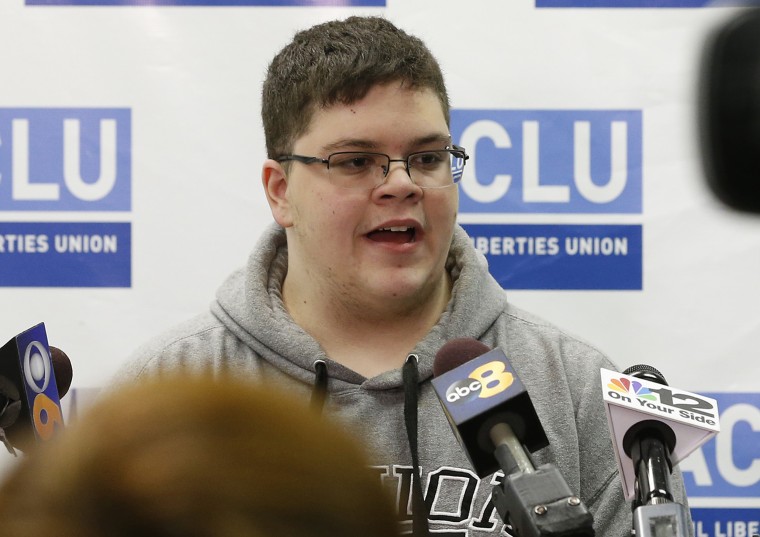Drew Adams, 18, is a high school senior in northern Florida. But in addition to studying for exams and waiting on college applications, Adams — who is transgender — is also embroiled in a lawsuit with his school board.
“As if high school isn’t hard enough, I shouldn’t need a court to keep my school from discriminating against me just because I want to use the same restroom as the other boys,” Adams told NBC News. “I hope no other student has to feel degraded and unwanted like I did at school.”
Adams filed a suit against the School Board of St. John’s County in Florida in 2017, after he was prevented from using the boys bathroom at Allen D. Nease High School in Ponte Vedra, which is about a 30-minute drive from Jacksonville.
“I am a boy and I know that with every fiber of my being,” Adams testified at his trial.
The district judge decided in Adams’ favor last July, agreeing with his attorneys at Lambda Legal that the school district violated his constitutional rights and his rights under Title IX of the Education Amendments Act of 1972, which bars discrimination “on the basis of sex.”
“Drew Adams is just like every other student at Nease High School, a teenager coming of age in a complicated, uncertain and changing world,” District Judge Timothy J. Corrigan wrote. “When it comes to his use of the bathroom, the law requires that he be treated like any other boy.”
Following Corrigan’s decision, the school district appealed in August 2018 to the 11th Circuit Court of Appeals, where Adams’ case is now pending.
A spokesperson from the school district told NBC News, “While currently in pending litigation, it would be inappropriate for us to comment on or try this case in the media”
Tara Borelli, a Lambda Legal attorney working on Adams’ case, told NBC News the suit goes far beyond just Drew Adams and could have implications for many other transgender young people “who are struggling every day just to go to school, because they don’t have equal access to school facilities.”
“Lambda Legal knows from the calls we receive that a significant number of kids are suffering under discriminatory policies at school every day,” Borelli said.
Adams and Lambda Legal received support late last week from more than 30 companies — including Apple, Google, Deutsche Bank and GlaxoSmithKline — that signed on to an amicus brief sent to the 11th Circuit Court by the Human Rights Campaign, a national LGBTQ advocacy group.
The friend-of-the-court brief argues that upholding the school’s bathroom policy would adversely affect the companies’ “ability to build and maintain diverse and inclusive workplaces.” The companies, the brief states, “have employees, stakeholders, and community members who identify as transgender or who have children who identify as transgender.”
“Employees may be reluctant to be transferred to a state in which your child might experience discrimination,” Sarah Warbelow, legal director of the Human Rights Campaign, told NBC News.
If the 11th Circuit does take up the case, the states of Alabama, Florida and Georgia would be affected by the ruling.
While Adams’ case is the first time the question of transgender students’ bathroom access has come before the 11th Circuit, similar cases have been working their way through other federal courts.
The 7th Circuit Court of Appeals in May 2017 ruled in favor of transgender student Ashton Whitaker, deciding that the high school student, who identifies as male, could use the boys bathroom.

Perhaps the most well-known case involving a trans student’s right to use facilities that match his gender identity is the Gavin Grimm case. In 2015, Grimm, a transgender male, filed the first federal lawsuit on the issue. Like Adams, Grimm was denied access to the boys restroom at his high school. However, Grimm’s case relied, in part, on Obama-era guidance that protected transgender students from discrimination. The Supreme Court sent the case back to the district court for reconsideration after the Trump administration reversed the Obama administration's legal guidance. The school district may decide to change its policy before the case returns to court.
Lawsuits regarding transgender students’ use of gender-segregated facilities have also been filed by nontransgender students and their parents. In the 9th Circuit Court of Appeals, Alliance Defending Freedom, a national organization known for fighting LGBTQ rights in court, is representing Parents for Privacy and Parents Rights in Education, claiming that transgender-inclusive restroom and locker room policies violate other students’ right to privacy.
The Supreme Court is currently deciding whether to weigh in on another such case, Doe v. Boyertown Area School District. In this case, nontransgender students are suing their Pennsylvania school for allowing transgender students to use the restroom that matches their gender identity.
As for Drew Adams’ case, Lambda Legal said “it could take up to a few months” before they hear anything back from the 11th Circuit. If the federal appeals court does take up the case, Adams said he hopes the suit helps “every student” to have the “same opportunity to be treated with dignity and respect, and to thrive at school.”

